BigCommerce and Shopify are two of the biggest names in ecommerce. Both help businesses create online shops with no coding experience needed and offer various tools to help them market, scale, and sell with ease.
That’s why they both made my list of the best ecommerce platforms. Still, some key differences could make one platform better than another, depending on what you’re looking for.
With its comprehensive marketing tools, extensive enterprise solutions, and organized inventory management tools for even the most massive product lists, BigCommerce pulls slightly ahead. However, don’t count Shopify out! Its shipping, payment, and website-building tools are great for businesses of all sizes.
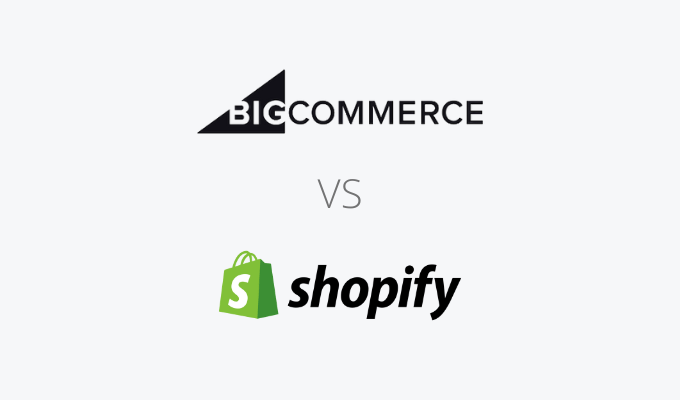
BigCommerce Pros and Cons
Pros
- Capable of managing massive inventories
- Well-rounded marketing tools
- Wide range of enterprise solutions
- Tons of out-of-the-box features
- Simple point-and-click website design
- No transaction fees
Cons
- Revenue caps for each plan
- Difficult to fully customize a website
- May offer too much for smaller sellers
- No option for recurring subscriptions
Shopify Pros and Cons
Pros
- Super affordable option for small businesses
- Huge collection of apps and plugins
- Helpful knowledge base
- Easy-to-use backend platform
- Streamlined shipping tools
Cons
- Many features require a plugin
- Limited free themes to choose from
- Must use Shopify Payments to avoid transaction fees
- Only 100 product variants allowed
Visual Website Builder: Shopify Wins
Shopify and BigCommerce make it extremely easy to create a website from scratch and start selling products from it. Each lets you start with a template that you can customize to fit the overall mood and purpose of your online store.
From there, you can drag and drop your way to a successful website. Add a header, insert an image carousel, or place a linked button with a few clicks of your mouse—no coding needed.
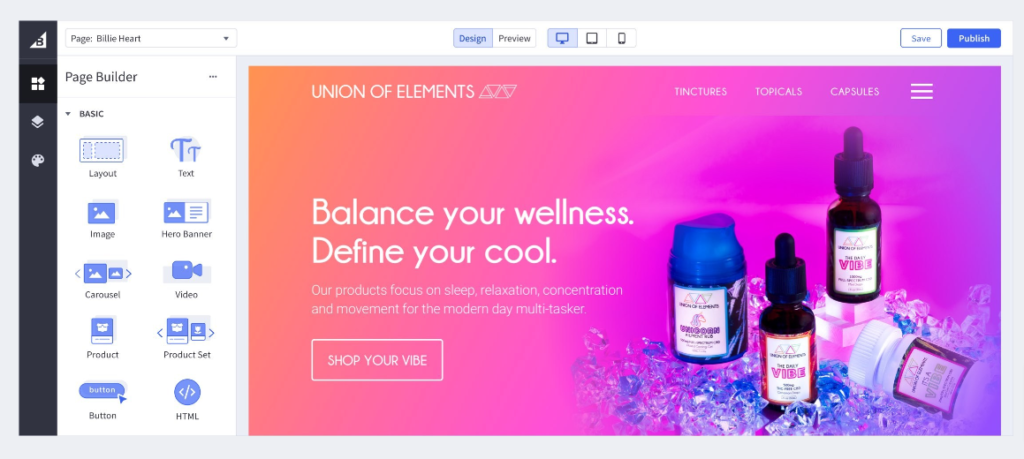
However, Shopify’s website builder pulls ahead. It may not be the most robust website builder on the web—that title is reserved for more versatile options, like Zyro and Wix—but it’s certainly a favorite for ecommerce sites.
First of all, it’s incredibly easy to use. Once you’ve selected a theme, you can use the page builder to move things around, add, or delete elements of the page. Regardless of what you do, your site will still look professionally designed.
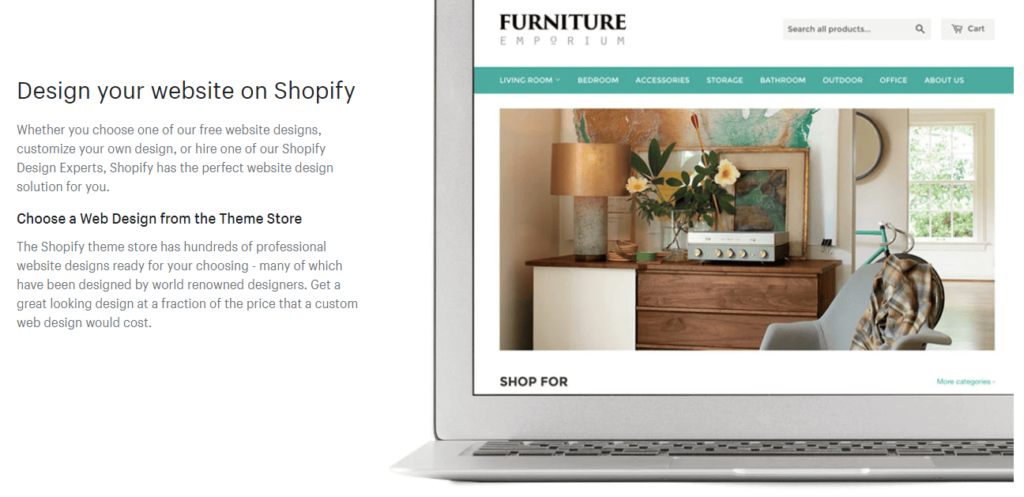
Although it’s somewhat limited in its initial free theme offerings, website owners can opt for plenty of premium designs to customize to their liking.
Shopify also offers more in-depth customization than BigCommerce. While many of BigCommerce’s sites have a similar overall feel, Shopify’s tools let you tweak your site with more control, ensuring that yours doesn’t look too much like your competitor’s.
Inventory Management Tools: BigCommerce Wins
The ability to organize products and track inventory is a necessity for online business owners. Both Shopify and BigCommerce make inventory management a breeze with simple ways to view all your products and add and remove items to sell.
Shopify’s backend dashboard can list all your products, giving you an at-a-glance view of everything you have for sale on your site. From there, edit quantities and add rules for what happens when your inventory gets low or an item goes out of stock.
Using the mobile app, you can scan barcodes of products to adjust your inventory automatically.
BigCommerce makes you work a little harder to see your inventory levels. You’ll also get a list of your products in list form, but you’ll have to click on each one to view your quantity.
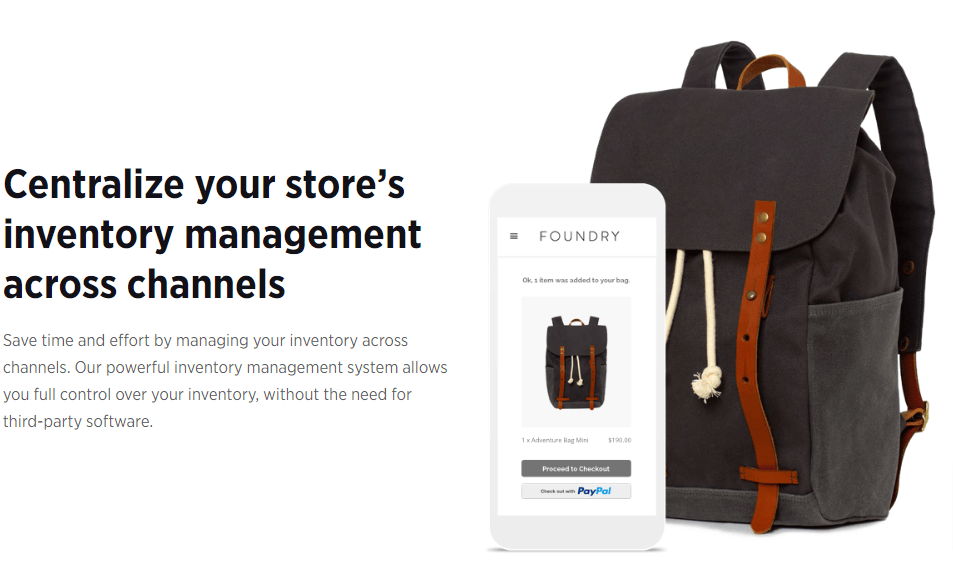
However, BigCommerce has a few advantages over Shopify.
First, it offers 600 variants for each product versus 100 with Shopify. So, a fashion company selling multiple colors, materials, and sizes of one type of shirt might benefit from the many options offered by BigCommerce.
BigCommerce also lets you track inventory from all your connected channels, like Instagram and Amazon, so there’s no need to switch between platforms to make adjustments.
You’ll also get detailed reports of your products’ order trends to help you make informed decisions on your inventory.
Shopping and Checkout Process: BigCommerce Wins
Shopping and checking out orders are certainly simple with both Shopify and BigCommerce.
Where Shopify excels is its popular Shop Pay one-click checkout that creates a speedy and simple checkout for customers.
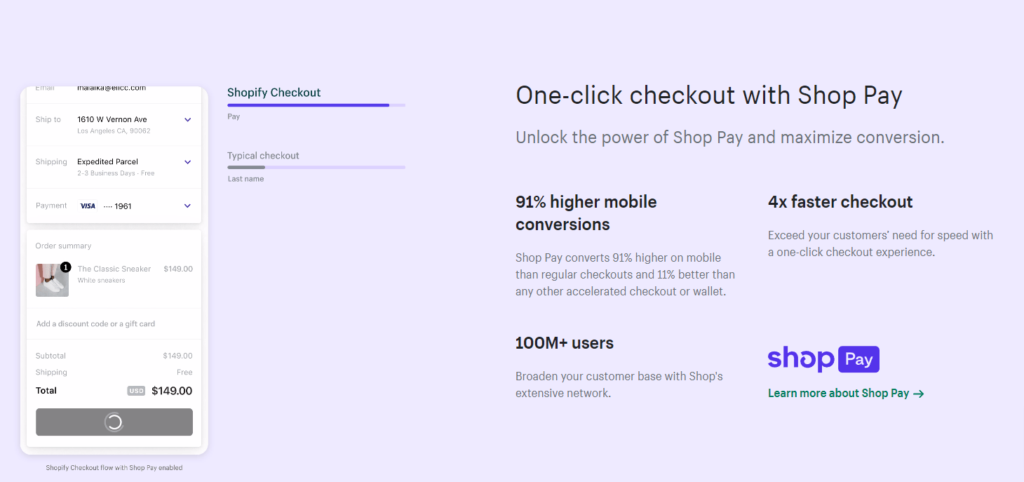
Shop Pay remembers a shopper’s payment and address information and automatically inserts it into checkouts using the feature. The customer can then complete their checkout in a matter of seconds without ever having to register an account on the retailer’s site.
Shopify also has plenty of options for customizing the shopper’s experience while browsing the website and purchasing, like adding a Try Before You Buy feature, including multiple product options, and creating shipping rules.
BigCommerce completely tailors its shopping experience, too. Its built-in customer segmentation allows for targeted coupons and discounts to go directly to the right customer groups as they shop.
Additionally, its Checkout SDK is among the most customizable of all ecommerce platforms. Tweak every aspect of your checkout to ensure that completing an order is as seamless for customers as it is to add items to their shopping carts.

Compared to Shopify’s Shop Pay, BigCommerce’s checkout can have a much different look and feel across websites, making it more unique to each website.
Payment Gateways: Shopify Wins
The best ecommerce platforms have multiple payment gateways to choose from, and that goes for Shopify and BigCommerce.
With BigCommerce, you’ll have 80+ options for collecting payments, including Venmo, PayPal, ACH payments, and Klarna. Most of them are built into the platform, so you won’t need any additional plugins or apps to use them.
Shopify has more than 100 payment partners you can connect with, depending on your country. For example, U.S. payments can come from Afterpay, Windcave, PayPal Express, and Checkout.com.
The downside is that these payment methods aren’t built in as they are in BigCommerce. You’ll need to find the integration through Shopify’s App Store to connect it.
However, Shopify slides ahead with Shopify Payments, its proprietary payment gateway that requires no third-party setup. It connects to major credit card companies plus Google Pay and Apple Pay, some of the most popular ways to pay.
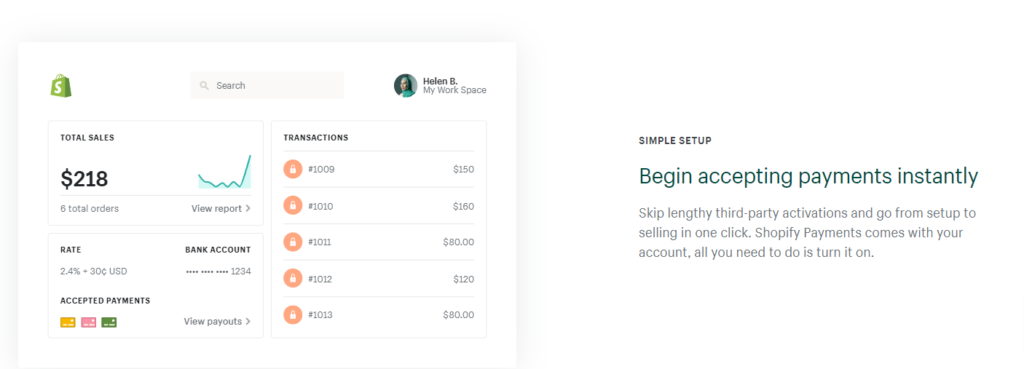
Shopify Payments also includes detailed reporting to help you track every transaction with ease.
Shipping Tools: Shopify Wins
Shopify and BigCommerce are mostly on par when it comes to shipping. Each comes with multiple shipping tools to streamline the process of getting your orders fulfilled and to customers quickly.
For instance, both platforms allow for dropshipping through app integrations and let businesses opt for fulfillment services if they’d prefer to have a third party fulfill their orders.
You’ll also access several shipping options, like flat-rate, price-based, or free shipping.
Both platforms also include shipping label creation and printing through in-platform software. However, Shopify offers shipping through multiple carriers if you use Shopify Shipping, which helps it distinguish itself as the shipping leader.
Shopify Shipping is a customizable shipping platform that you can use to fulfill, ship, and track packages.
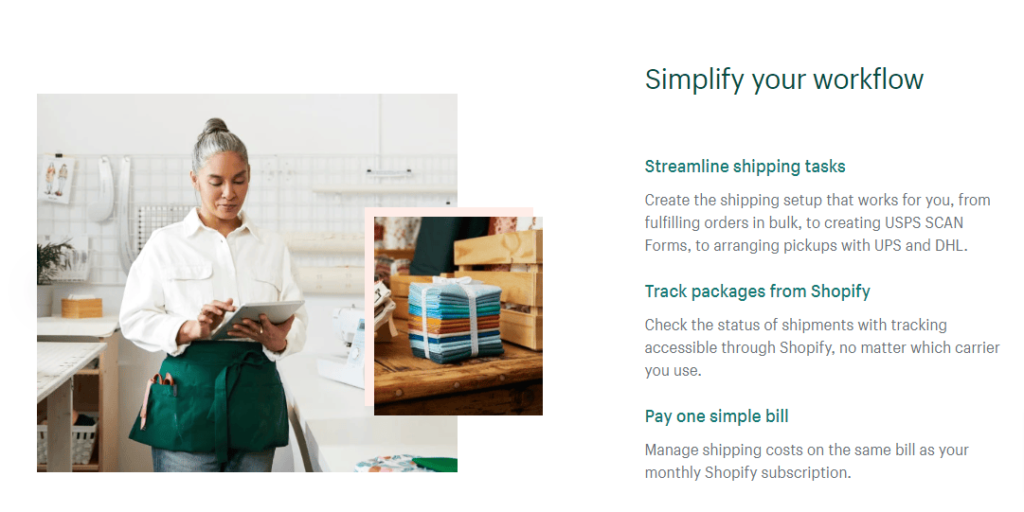
The tool comes free with Shopify subscriptions for ecommerce businesses that ship from the United States, Australia, and Canada.
Because there’s no additional fee for Shopify Shipping, you can conveniently pay all your shipping fees with your regular Shopify bill.
One of the biggest perks of Shopify Shipping is its massive discounts of up to 88% on regular shipping rates, thanks to Shopify’s partnerships with some of the largest delivery services, including DHL and UPS.
SEO and Marketing Tools: BigCommerce Wins
BigCommerce has several SEO and marketing tools right out of the box. Its content delivery network stores copies of your site’s files, like images and plugin files, to automatically make your site load faster.
BigCommerce also creates optimized URLs for your pages and blog posts, although you’re free to change them if there’s a specific formula you’d like to use. All pages are also Google AMP-supported for optimized mobile performance and speed.
Your store will also be safe from duplicate content through BigCommerce’s unique URL checker. And, BigCommerce shops include automatic rich snippets that help show potential customers the basic information they need to know about your products when they search on Google.
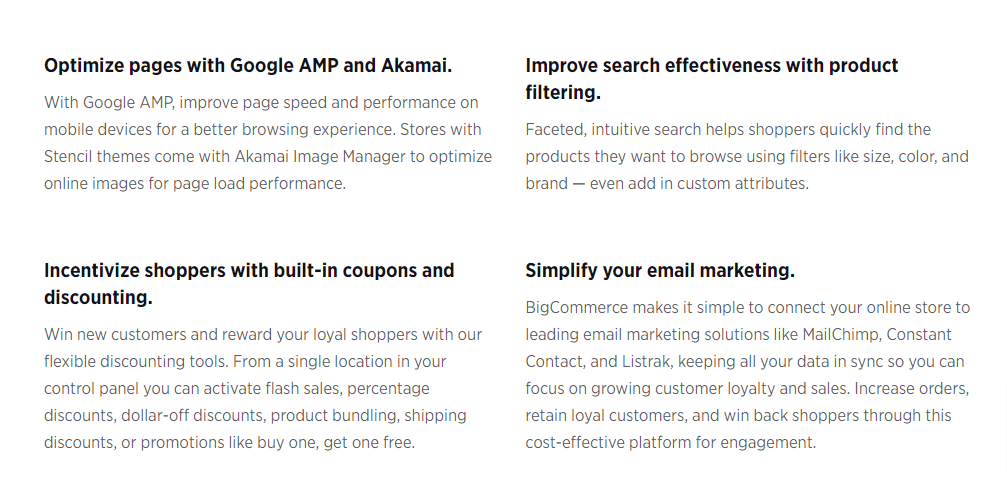
As for marketing, you’ll get built-in tools for creating coupons, discounts, bundles, promotions, flash sales, and more ways for customers to save. Plus, connect with Google Shopping for search-engine-friendly sales, add social share buttons to product pages, and activate the abandoned cart tool to bring lost customers back.
This isn’t to say that Shopify does poorly in the SEO and marketing space. It has all the basics, including custom URLs, URL redirects, auto-generated canonical tags, and custom meta descriptions and title tags.
However, it also doesn’t automatically take action to prevent duplicate content like BigCommerce does. You’ll also probably need to add SEO and marketing integrations from the Shopify app store to get all the features you want, as there aren’t as many built-in tools available.
Multi-Channel Management: BigCommerce Wins
If you sell on multiple marketplaces, like Amazon and Wish, you’ll have an easier time doing so if you can manage your products from one location.
With BigCommerce and Shopify, you can. Connect to Etsy, eBay, and some of the other largest marketplaces around the globe through seamless integrations.
For example, BigCommerce prioritizes connecting your channels through its popular partner, Feedonomics.
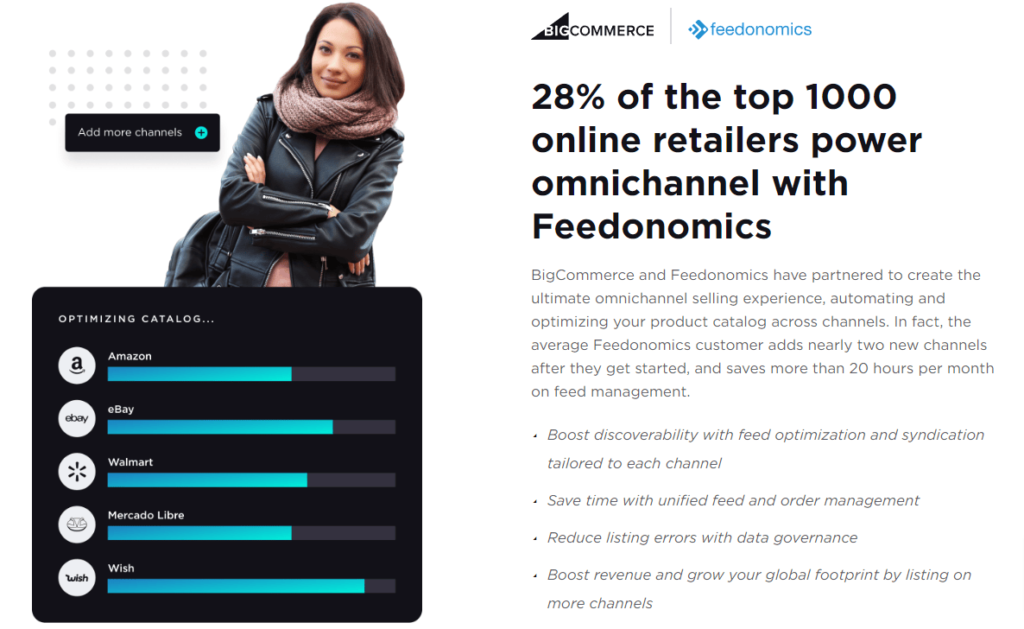
With the right integrations, you can manage your inventory, view sales, and analyze reports for all your connected channels from your BigCommerce dashboard.
Shopify also allows for multi-channel selling through its plentiful selection of apps that connect to your favorite marketplaces.
For instance, you can sell on Facebook and Instagram with one integration that offers customers one-tap checkouts and lets businesses customize the look and feel of their shops.

If one of these platforms takes the edge, it’s BigCommerce because of its Channel Manager feature. The tool is included on the BigCommerce dashboard, giving businesses one-click access to all their connected selling channels.
It includes native integrations for Facebook, Instagram, Amazon, and Pinterest to streamline your workflows while selling from each. One-click channel additions make it easy for you to test out new sales channels without adding or removing a bunch of website code.
Apps, Plugins, and Integrations: Shopify Wins
Both Shopify and BigCommerce come with their own app store, which is where you’ll find integrations and apps to make your website more functional.
BigCommerce’s app store includes more than 1,100 apps and integrations, like the popular ShipStation app and BundleB2B for B2B sales.
Its app store is laid out well, offers several free apps, and includes app collections for you to find all the apps you’ll need for specific purposes, like marketing.
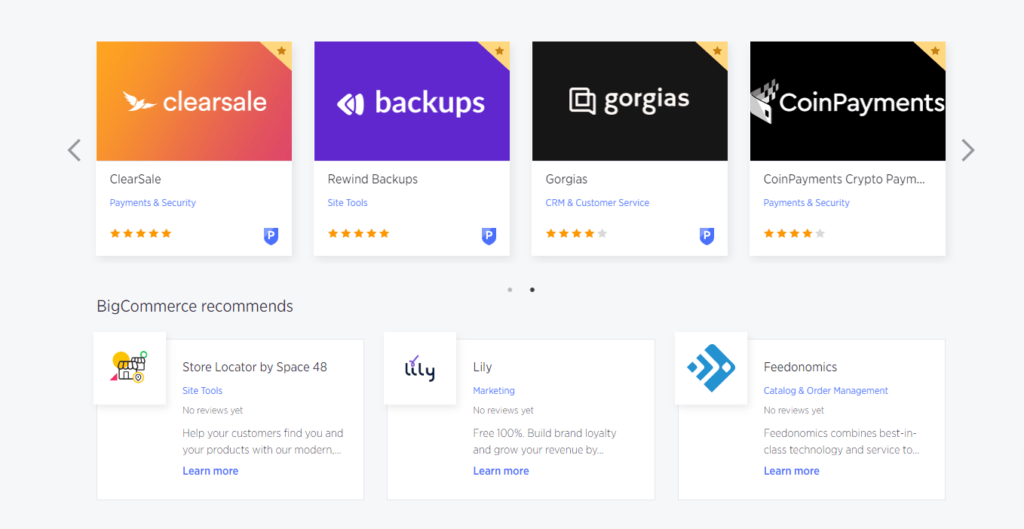
BigCommerce’s app store has significantly fewer apps than Shopify’s app store, featuring more than 6,000 options.
Some of that is because BigCommerce includes more out-of-the-box features than Shopify, skipping the need for additional apps.
However, Shopify apps are simple to search for and install, so adding the ones you need isn’t a hassle. Some smaller sellers might even prefer a simpler site to start with, along with the ability to quickly add the apps and integrations they need from the app store.
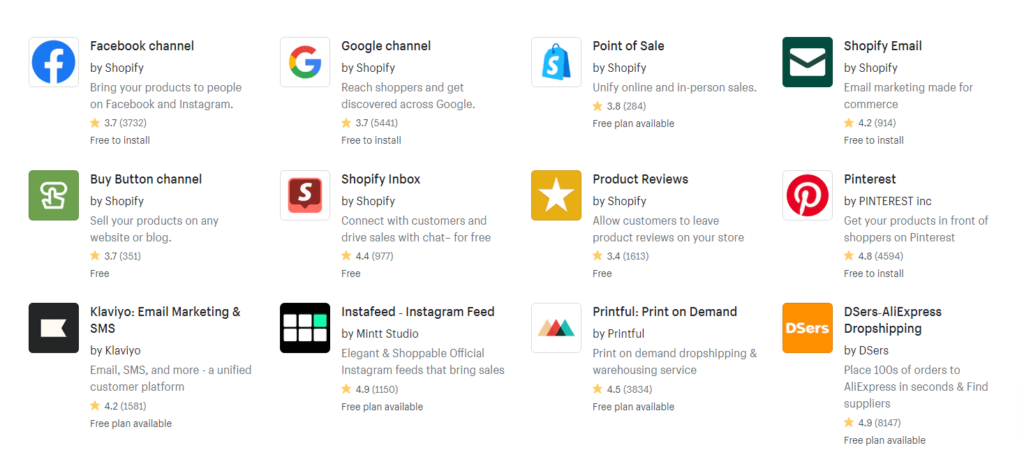
Enterprise Solutions: BigCommerce Wins
Built specifically for scaling, enterprise solutions can help your ecommerce site grow from a one-product local company to selling thousands of products and variants to customers all over the world.
BigCommerce’s enterprise solutions are stacked, and they’re based on the company’s foundation of providing a flexible platform that shifts with each business’s needs.
The open SaaS platform allows freedom in how you want to run and grow your business. BigCommerce also provides all the extras you’ll need for success, including enterprise launch coaching, growth coaching, and customer success management.
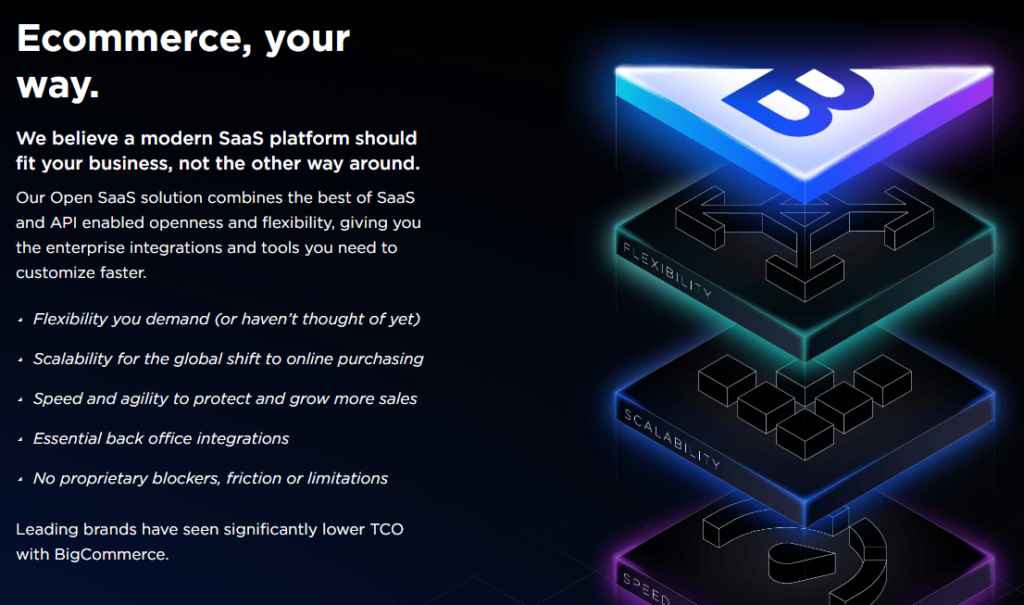
BigCommerce’s partner program will match your business with agencies and tech experts that can help you along the way, too. Find vetted professionals to customize your site’s shopping experiences, find the best integrations for your site, and create a successful digital strategy.
Shopify also provides enterprise solutions via Shopify Plus.
In addition to its excellent customizability, Shopify Plus includes Shopify Flow, a tool that lets you manage your integrations and connect your tools to one another with a visual workflow.
Shopify Plus customers get access to a partner program similar to BigCommerce’s that can assist with everything from product development to product launches.

Although both companies can handle the enterprise needs of most businesses, BigCommerce is a bit more flexible as far as long-term scalability.
Even the most massive inventories and product catalogs can continue to grow with BigCommerce’s excellent inventory management and product variation options.
Final Verdict
Honestly, it’s challenging to compare BigCommerce and Shopify—two of the absolute best in the ecommerce platform industry—and determine a clear winner. They both have plenty working for them, including Shopify’s built-in payment gateway and shipping tools and BigCommerce’s robust inventory and multi-channel management capabilities.
Still, BigCommerce has the ability to cater to more businesses, including those with thousands of products and variants. BigCommerce’s powerful SEO tools, merchandising, and customizable shopping tools can get your business where you want it, from the smallest companies to large-scale online sellers.
from Quick Sprout https://ift.tt/qsnuSgY
via IFTTT


No comments:
Post a Comment